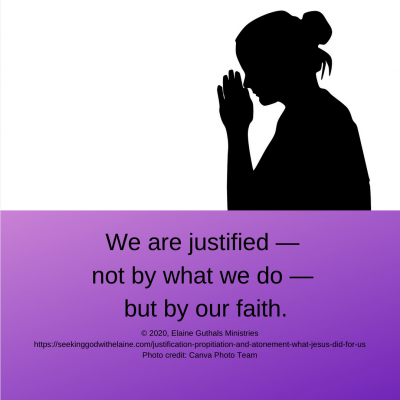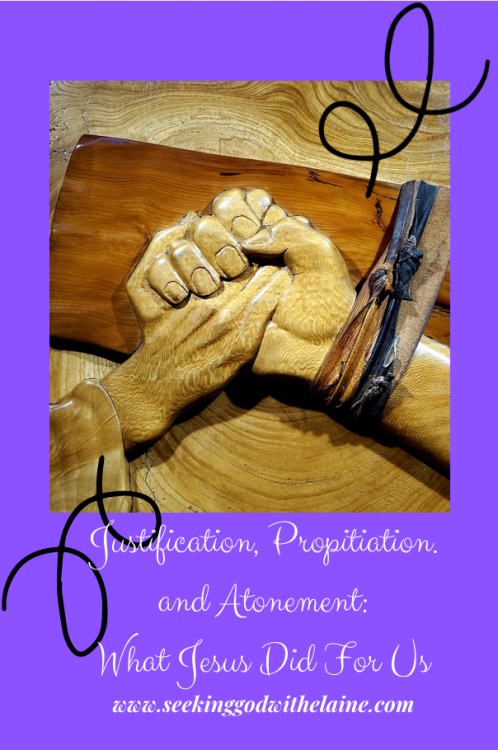Churchy words can sometimes confuse us. This daily devotional reviews how justification, propitiation, and atonement could only be accomplished by Jesus.
Devotions in the Self-Discipline Review series

All year, we’ve been looking at self-discipline. We looked at self-discipline as the operational plan for self-control because it talked about improvement.
We are reviewing everything and hopefully putting all of the building blocks together. What I am doing is going through all of the devotions for the year and pulling out the nuggets.
I am formatting this as a glossary page. If I already have one, I will combine them later.
God wants us to change our heart. He wants us to cut out the old sin and replace it with His love and grace. He doesn’t want it to just be a ritual or symbolic.
God wants the change to be real. It has to be personal and genuine.
We make the change, we get blessings. We don’t make the change, we get curses.
● We become children of God (Jn. 1: 12).
● We gain eternal life (Jn. 3: 16).
● We grow in our relationship with Him (I Pet. 3: 18) (Is Repentance Necessary).
We also gain some churchy words. Jesus justifies us and is the atonement and propitiation for us.
The next devotion is going to look at sanctification. Because of word count, we are going to go ahead and tie all the churchy words together in this devotion.
Justification
Justification is the act through the merits of Christ that makes us free from sin because we are following God’s moral laws. Jesus justifies us when we put our lives in His hand.
Jesus justifies us when we put our lives in His hand (How the Righteousness of God Filters to Us).
Justification is free. It is the gift of grace. We don’t have to pay for it by cleaning up our acts. We don’t earn it by doing the do’s and not doing the don’ts (How the Righteousness of God Filters to Us).
The steps of justification are that God judges us according to the laws and commandments that He has given, and sins are pardoned when we submit to God (How the Righteousness of God Filters to Us).
Sometimes, we might get a little squirrelly about this being a one-shot gift. Jesus paid the price once — and that was enough to justify us (How the Righteousness of God Filters to Us).
When we are living to imitate God, we have peace through Jesus (Rom. 5: 1). He justifies us upon conversion, giving us peace (What Are the Fruits of Righteousness?).
When we accepted salvation, we were justified, so those things were fixed (Is Peace an Attitude?).
If we are justified before God — made right before God — that means something was wrong. The wrongs were we were spiritually dead, separated from God, and living a sinful life (Is Peace an Attitude?).
The Bible was designed by God to be a teaching book. It teaches us the plan of salvation and the justification needed for us to believe (How Do We Profit from the Scriptures?).
True, Matthew 25: 31-46 says there has to be evidence of faith. We have to be careful and not think those acts justify us. Belief gets us salvation. Faith produces works that are the result of our obedience. In turn, those works show our faith to others (How the Righteousness of God Filters to Us).
Mercy doesn’t negate or dilute God’s laws and commandments. Neither does justification and grace. Sin is still evil (How the Righteousness of God Filters to Us).
Because He justified us, we are glorified (How Does Predestination Fit In?).

-
We are not only freed from sin, but we are also justified through Christ. We are no longer responsible for the penalty of sin. Because of that, it no longer has a hold on us (What Does It Mean to be Crucified with Christ?).
-
It is hard to the to live up to the law. We don’t have to do that. The much easier solution is to believe that Jesus has already paid the price of sin for us. We don’t have to do some super complicated thing to earn salvation. He justified us (Where Is Jesus?).
-
If Jesus is not Lord of our lives, we do not have hope. If Jesus didn’t justify us, we wouldn’t have hope (How Do We Know We Have Eternal Hope?).
-
We are justified — not by what we do — but by our faith (Discerning the Voice of God between the Law and the Gospel).
-
Our hope stems from our justification through faith (What Is Hope in God to a Disciple of Christ?).
See Also
Propitiation
Propitiation means that a substitute is offered to avoid God’s wrath.
Jesus became the propitiation so that we could be restored to the Father (What Was Jesus’ Mission (Part 2)).
Jesus was the substitute — the propitiation — so that we could be redeemed. That means He had to be us — body, soul, and spirit (Why Jesus Became a Man).
Jesus substituted — became the propitiation — for us so He could do the hard stuff, the stuff we would never be able to do. Jesus knew God’s wrath had to be appeased so He shed His blood to pay the price for our sins (Paul’s Take on Children of God).
It was God’s idea. God picked the substitute. It was His plan of salvation. He picked the Sacrifice (Did Jesus or His Blood Redeem Us?).
See Also
Atonement
Atonement is about repayment for a wrong.
God knew that there would need to be atonement for the sin. The only way that would happen is a blood sacrifice (The Foundation of the Church).
Because of the magnificence of His glory, we have the assurance that God can provide the atonement for our sins (What Is Hope in God to a Disciple of Christ?).
Jesus came to earth as our substitute to atone for our sins. The only way He could do that was to shed His blood (How Do We Believe in Jesus?).

Atonement is all about the blood. It isn’t about the waking up from the death sleep. Jesus’ blood provided the atonement – not the obedience, not the sacrifice – the blood (Life from the Cross; Does God Really Forgive and Forget Sin?).
It was Jesus’ blood that atoned for our sins. It wasn’t his birth. It wasn’t that He died — if He would have died but not shed His blood, the sacrifice would not have been made. It wasn’t even His resurrection. It was that His blood was shed to pay the penalty for our sins (What Is the War in Heaven?).
The repayment was the shedding of His blood (Paul’s Take on Children of God).
Our blood won’t atone, so we need a substitute (Did Jesus or His Blood Redeem Us?).
God gave us the laws and commandments to show us they could not save us. On our own, we cannot keep the laws and commandments. Therefore, we need a Savior to pay the price for our atonement (Can We Change the Scriptures?).
Why does Jesus intercede for us? It was based on atonement. Well, atonement is about repayment for a wrong. Since Jesus has made the repayment, He has a vested interest in us (Who Is Jesus?).
Jesus’ blood provided the atonement that purified us (Why Jesus Became a Man).
When we think about God giving Moses the instructions for the temple, it started out with the priests asking for forgiveness for themselves (Lev. 16: 6). They had to get their relationship right with God before they could approach God to intercede for the nation of Israel. Jesus didn’t have to do that. Jesus had not sinned. There was nothing for which to atone. What took Jesus to the cross and held Him there was His everlasting love. He would complete the plan of salvation for us (Comprehending Christ’s Purpose through His Love).
Jesus’ blood was the atonement for our sins, but the transaction hasn’t been closed out yet (What Is the Tribulation?).
See Also
Tying Them Together
Sanctification is the evidence of justification. It starts with regeneration and holiness (What Is the Relationship between Righteousness and Sanctification?).
Atonement had to be part of the justification process – or there would be no need for substitution (Did Jesus or His Blood Redeem Us?).
In order to justify us, Jesus had to be the propitiation for us (Did Jesus or His Blood Redeem Us?).
When we ask Jesus to be our King, that means we know that, when we continue to sin, God will correct us. Then comes all the churchy words: justification, sanctification, regeneration. Add in holiness, righteousness, and godliness (How Do We Believe in Jesus?).
Where propitiation is about the substitute, atonement is about repayment for a wrong. The repayment was the shedding of His blood. When I see propitiation, I see Jesus. When I see atonement, I see blood. (Did Jesus or His Blood Redeem Us?).
Atonement had to be part of the justification process. Otherwise, there would be no need for substitution. Atonement is required because God is just (Did Jesus or His Blood Redeem Us?).
Jesus justifies us when we put our lives in His hand. Justification means the act of making something righteous before God through forgiveness. We needed this forgiveness because all of us have sinned (Rom. 3: 23). It constitutes a change in our character that is achieved through sanctification (How the Righteousness of God Filters to Us).
We need to intimately know Jesus as God and as Man. We need to personally know the benefits of salvation: justification, adoption, sanctification, and eternal life (Why God Calls Us to Give Up Everything).
See Also

Only Jesus could do the churchy words. He could free us from sin because only His blood was acceptable as the repayment. That means only He could substitute for us.
Father God. We are sinful people. That sin separates us from You. We don’t want to be separated from You in any way. You, also, didn’t want to be separated from us. To rectify that, You sent Your Son Jesus to substitute for us as only His blood was acceptable for atonement of our sins. We don’t necessarily understand everything, but we believe in You. Amen.
What do you think?
Leave me a comment below (about this or anything else) or head over to my Facebook group for some interactive discussion.
If you don’t understand something and would like further clarification, please contact me.
If you have not signed up for the email daily or weekly providing the link to the devotions and the newsletter, do so below.
If God has used this devotion to speak with you, consider sharing it on social media.